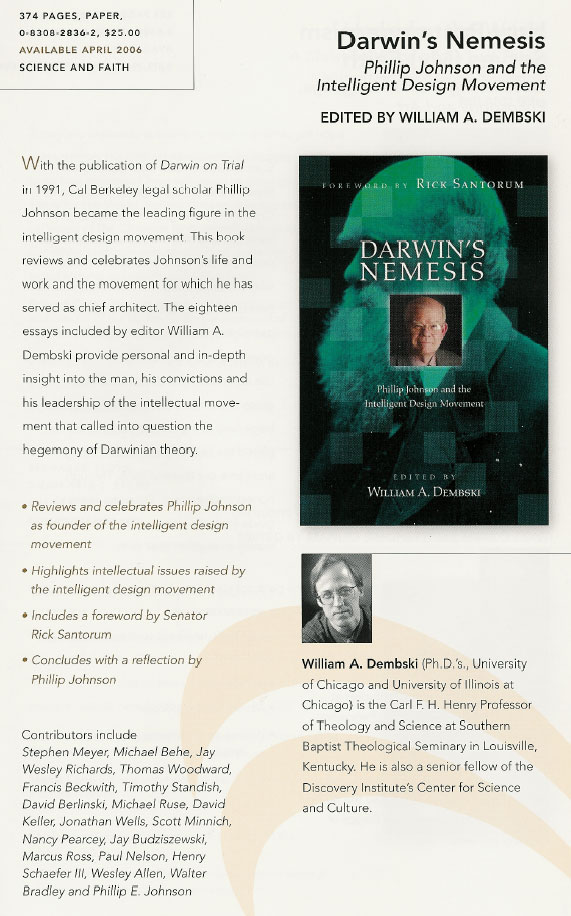Here’s some publicity from IVP for the forthcoming Phil Johnson festschrift — Darwin’s Nemesis. I was able last minute to insert some brief comment about Dover into the preface, which I give below:

Life after Dover
On December 20, 2005, as this book was going to press, Judge John E. Jones III rendered his verdict in the first court case involving intelligent design. In Kitzmiller v. Dover, also billed as Scopes II, Judge Jones not only struck down the Dover school board policy advocating intelligent design but also identified intelligent design as nonscientific and fundamentally religious. Accordingly, he concluded that the teaching of intelligent design in public school science curricula violates the Establishment Clause and therefore is unconstitutional.
It is hard to imagine that a court decision could have been formulated more negatively against intelligent design (for the actual decision, see www .pamd.uscourts.gov/kitzmiller/kitzmiller_342.pdf). In light of this decision, one may therefore wonder about the appropriateness of titling this book Darwin’s Nemesis. To read Judge Jones’s decision, one gets the impression that Darwin is alive and quite well. Even so, let me suggest that this decision is a bump in the road and that Phillip Johnson’s program for dismantling Darwinism remains well in hand.
To see that Judge Jones’s decision is not nearly the setback for intelligent design that its critics would like to imagine, let’s start by considering what would have happened if the judge had ruled in favor of the Dover policy. Such a ruling would have emboldened school boards, legislators, and grass roots organizations to push for intelligent design in the public school science curricula across the nation. As a consequence, this case really would have been a Waterloo for the supporters of neo-Darwinian evolution (the form of evolution taught in all the textbooks).
Conversely, the actual ruling is not a Waterloo for the intelligent design side. Certainly it will put a damper on some school boards that would otherwise have been interested in promoting intelligent design. But this is not a Supreme Court decision. Nor is it likely this decision will be appealed since the Dover school board that instituted the controversial policy supporting intelligent design was voted out and replaced November 2005 with a new board that campaigned on the promise of overturning the policy.
Without an explicit Supreme Court decision against intelligent design, we can expect continued grass roots pressure to promote intelligent design and undercut neo-Darwinian evolution in the public schools. Because of Kitzmiller v. Dover, school boards and state legislators may tread more cautiously, but tread on evolution they will — the culture war demands it!
It is therefore naive to think that this case threatens to derail intelligent design. Intelligent design is rapidly gaining an international following. It is also crossing metaphysical and theological boundaries. I now correspond with ID proponents from every continent (save Antarctica). Moreover, I’ve seen intelligent design embraced by Jews, Muslims, Hindus, Buddhists, agnostics, and even atheists. The idea that intelligent design is purely an “American thing” or an “evangelical Christian thing” can therefore no longer be maintained.
Even if the courts manage to censor intelligent design at the grade and high school levels (and with the Internet censorship means nothing to the enterprising student), they remain powerless to censor intelligent design at the college and university levels. Intelligent design is quickly gaining momentum among college and graduate students. Three years ago, there was one IDEA Center at the University of California at San Diego (IDEA = Intelligent Design and Evolution Awareness — see
Ultimately, the significance of a court case like Kitzmiller v. Dover depends not on a judge’s decision but on the cultural forces that serve as the backdrop against which the decision is made. Take the Scopes Trial. In most persons’ minds, it represents a decisive victory for evolution. Yet, in the actual trial, the decision went against evolution (John Scopes was convicted of violating a Tennessee statute that forbade the teaching of evolution).
Judge Jones’s decision may make life in the short term more difficult for ID proponents. But the work of intelligent design will continue. In fact, it is likely to continue more effectively than if the judge had ruled in favor of intelligent design, which would have encouraged complacency, suggesting that intelligent design had already won the day when in fact intelligent design still has much to accomplish in developing its scientific and intellectual program.
Instead of ruling narrowly on the actual Dover policy, Judge Jones saw his chance to enter the history books by assuming an activist role, ruling broadly, and declaring intelligent design to be unconstitutional. Yet, if he and his ruling are remembered at all, it will be not for valiantly defending science but for pandering to a failed reductionist way of doing science.
Just as a tree that has been ringed (i.e., had its bark completely cut through on all sides) is effectively dead even if it retains its leaves and appears alive, so Darwinism has met its match with the movement initiated by Phillip Johnson. Expect Darwinism’s death throes, like Judge Jones’s decision, to continue for some time. But don’t mistake death throes for true vitality. Ironically, Judge Jones’s decision is likely to prove a blessing for the intelligent design movement, spurring its proponents to greater heights and thereby fostering its intellectual vitality and ultimate success.